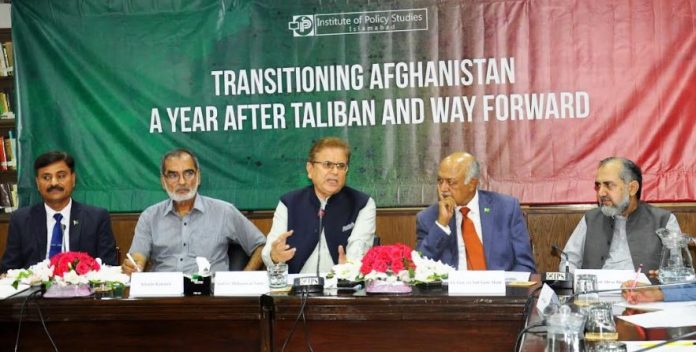DNA
Islamabad, Aug 27: The Taliban government or the Islamic Emirates of Afghanistan (IEA), going through a political transition, from a battle-hardened resistance force to a state government, is facing several voids that cannot be filled right away or in a disconnected manner. This transition in Afghanistan presents a role for the international community, especially regional countries, towards facilitating the desired transformation through a dynamic, persistent, and symbiotic engagement at multiple levels.
These views were reflected in a heart-to-heart discussion followed by a keynote speech of Ambassador (r) Mohammad Sadiq, special assistant to the prime minister/minister of state and Pakistan’s special representative for Afghanistan in a roundtable titled “Transitioning Afghanistan” at Institute of Policy Studies (IPS).
The in-camera address by Ambassador Sadiq to a select gathering of Islamabad’s intelligentsia based on Chatham House rules, aimed at assessing the actual picture of Afghanistan and how Pakistan should carry itself in the scenario, was moderated by Brig (R) Dr. Saif-ur-Rehman Malik, IPS’s senior research fellow. Lt Gen Asif Yasin Malik (retd), former Corp Commander Peshawar, Ambassador (r) Syed Abrar Hussain, vice chairman IPS, Professor Dr Fakhar-ul-Islam, director, Pakistan Study Centre, University of Peshawar, Maj Gen Dr Shahid Ahmad Hashmat (Retd), Obaid Ullah Baheer, former faculty member (IR), American University, Kabul, Tahir Khan, senior journalist and Afghan affairs analyst, Dr Farhat Taj, associate professor, University of Tromsø, Norway, Dr Salma Malik, assistant professor, defense & strategic studies, Quaid-i-Azam, University, and Brigadier (R) Said Nazir Mohmad also took part in the discussion.
Concluding the roundtable proceedings, Khalid Rahman, IPS’ chairman, remarked that the situation in Afghanistan is still precarious after one year of an ‘exclusive’ Taliban rule as, among other things, the demand for an inclusive government for it to be recognized has created a vacuum that can’t be addressed immediately. Moreover, the failure of the US’ clueless leadership to adopt and formulate enduring policies for Afghanistan which was on its canvas for two decades presents a liability to not only Afghanistan but also to the entire world.
In this picture, Afghanistan, which has been abandoned by other stakeholders as well, is now under a resistance force that came unprepared and unplanned to govern a nation. Consequently, the transformation would be a time-taking process. However, an important factor that can largely contribute to the required transformation is the world’s engagement with Afghanistan across different domains and levels, Rahman emphasized.He propounded that Pakistan needs to persistently maintain its proactive approach and policy direction, while comprehending that the process is time-taking. At the same time, it is also important to create awareness about this at the national level. Pakistan must also address internal and external factors negatively affecting its national image in Afghanistan.

















